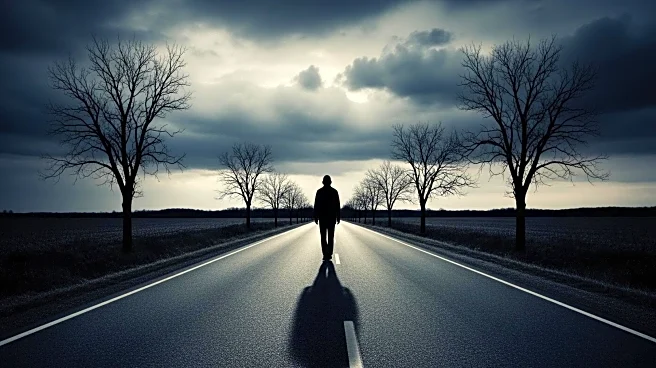What's Happening?
Francis Lawrence, known for his work on The Hunger Games, has directed a new adaptation of Stephen King's novel 'The Long Walk'. The film, set in a dystopian future, follows fifty young men chosen by lottery to participate in a brutal walking contest. The participants must maintain a pace of at least three miles per hour or face execution. The story, originally written by King at age 19, explores themes of survival and human endurance amidst a severe economic depression. The film features a strong cast including Cooper Hoffman, David Jonsson, and Mark Hamill, who plays the sadistic military figure overseeing the contest.
Why It's Important?
The adaptation of 'The Long Walk' highlights the enduring appeal of Stephen King's work and its ability to resonate with contemporary audiences. The film's exploration of themes such as economic hardship and authoritarian control may reflect current societal concerns, offering a poignant commentary on the human condition. The performances, particularly by Hoffman and Jonsson, showcase emerging talent in the film industry, while Lawrence's direction underscores his expertise in handling complex narratives. The film's release could influence future adaptations of King's work and contribute to ongoing discussions about dystopian narratives in cinema.
What's Next?
Following its release, 'The Long Walk' may spark discussions among audiences and critics about its thematic relevance and cinematic execution. The film could potentially lead to further adaptations of King's lesser-known works, expanding his influence in the film industry. Additionally, the performances of the young cast may open new opportunities for them in Hollywood, while Lawrence's direction might pave the way for more projects in the dystopian genre.
Beyond the Headlines
The film's depiction of a dystopian society raises ethical questions about the lengths to which individuals might go for survival and the impact of authoritarian regimes on personal freedoms. It also prompts reflection on the psychological and physical toll of extreme conditions, offering a deeper understanding of human resilience. The adaptation may contribute to cultural conversations about the role of entertainment in addressing serious societal issues.









